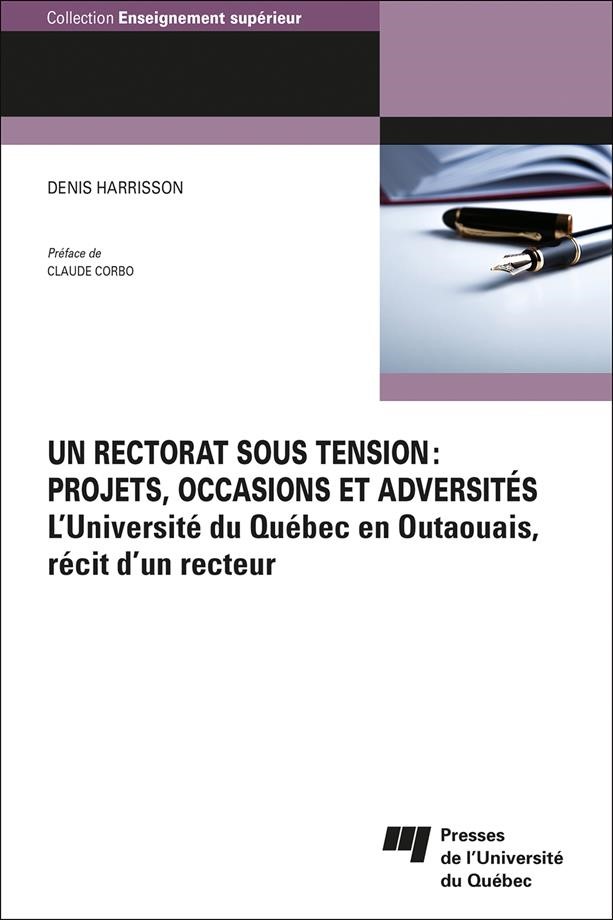After writing about his five-year term (2015-2020) as president of Université du Québec en Outaouais (UQO) in his book Un rectorat sous tension : projets, occasions et adversités [A presidency under pressure: projects, opportunities and challenges], Dr. Harrisson sat down with University Affairs to answer a few questions about his experience. In his preface, former president of Université du Québec à Montréal Claude Corbo writes that with this book, Dr. Harrisson “provides a service to the entire Quebec academic community by inviting us to reflect on a wide range of issues relating to the internal dynamics of university life, the conditions needed for knowledge generation and dissemination, university governance, and the relationship with society at large and government.” In this interview, Dr. Harrisson discusses what led him down this path.
University Affairs: Few leaders choose to tell the story of what goes on behind the closed doors of university administration. Even fewer do so when their experience was not an easy one. What prompted you to take the plunge?
Dr. Harrisson: I had read a book by Robert Lacroix, a former president of Université de Montréal. And that’s the approach that he took. I also read one by Clark Kerr, a former president of the University of California, Berkeley, who wrote several candid and honest books about university administration. My experience was the post-2012 period [following Quebec’s Maple Spring protests]. There was a lot going on at UQO.
Read more: The dubious legacy of Quebec’s Maple Spring
I wanted to be sincere and genuine. So, in the book, I delivered my thoughts openly and without bitterness. Labour relations are difficult at many universities, but we never talk about it.
I was a faculty member for a long time, but in that position, you don’t actually know how the university works. You think you know, but you don’t. So my first goal with this book was to say, “Here’s how it works,” as I see it. The second [was to explain] how we experienced the post-2012 period on the inside. I felt that I had a perspective to share. I think that if potential candidates for the president’s position are saying to themselves, “This will be a quiet way to cap off my career. It’ll be fun,” then they have no idea. The little games that go on behind the scenes, the power struggles, relations with government, the community, internal groups… it’s a balancing act. When someone makes a request, it’s always in a vacuum. But when you look closely, if you do what they ask, it’ll have consequences for someone else. There’s a domino effect. [I wanted to] try to explain that.
UA: Did you write the book that you wished you had read before becoming a university president?
Dr. Harrisson: I certainly would have appreciated reading a book about a president’s experiences. You go into it blind. I had been a vice-president, director of a research centre and department chair, but that still wasn’t enough to prepare me. As a president, you’re really on your own. People rarely come to see you and say, “Here’s a solution to a problem I am having.” When someone comes to you with a problem, it’s because no one else could resolve it. You can’t expect to always be thanked for the things you do. You have to be humble and have a thick enough skin to accept criticism, even when it’s not your fault.

UA: You don’t hold back when it comes to tensions between the administration and the unions at UQO – relations that are not usually discussed so openly. Why was it important to you to expose these issues?
Dr. Harrisson: Truth is, it’s still quite delicate. At the time, tensions were running highest at UQO, although when I’d go to Universities Canada meetings, I’d see that things were pretty rocky in other provinces too. I come from a union background. I never thought it would be so hard. There was no way to agree or compromise. The classic demands for working conditions, salary, all that, were never the issue – it was always governance. That’s what made it so challenging, because the union wanted to have a seat at the university’s governance table.
UA: You paint a rather somber picture of collegiality. In this regard, is UQO the exception or the rule?
Mr. Harrisson: Shared governance works if you’re acting in good faith and you know why you’re there. But what I found particularly difficult was when the union got involved. For example, they’d say: “Shared governance doesn’t mean the faculty members, it means us. If you want shared governance, you have to go through us. We’ll tell you who will sit on this committee or that body and then we’ll give them instructions.” That’s not shared governance.
I think there’s a lot to consider when it comes to the different bodies. They might give it some thought at Université du Québec, but any change would have to be legislated. And when it comes to the legislation, no one will touch that with a 10-foot pole.
UA: Does writing about your experience allow you, to a certain degree, to take a step back from what happened and see things in a new light?
Dr. Harrisson: Of course, writing is a way of taking stock. It’s also a way of reflecting more deeply on what happened. What I can say is that, having written this book, I would be a much better president now than I was at the time, that’s for sure. But that’s behind me now.
UA: Now that you’ve shared your experience in a book, what stays with you from your time as president?
Dr. Harrisson: I left with no regrets. I never thought, “I should never have taken that job.” I’m very glad I did. I learned a lot, and I think [the conflicts] died down about a year before I left. It became a lot more civil. Also, parallel to all that, we worked on many projects. That’s what was so wonderful. We had special status in Outaouais to develop the university. In the end, I was much more interested in that than in these internal affairs. The little battles, well, they bring some colour to daily life. But the mandate was to develop Université du Québec en Outaouais and to obtain financing from the Quebec government to develop new programs.
UA: In 2022, a report by the Observatoire de développement de l’Outaouais estimated that UQO should have 60 more programs than what they are offering. With such a big gap, is it even realistic to believe that UQO will one day catch up, or will this be a never-ending challenge?
Mr. Harrisson: UQO will never be able to develop the 60 programs that it needs. First of all, if it added 60 programs all at once, it would need the resources to handle all that. I think the administration has to sit down with the government and come up with a long-term plan over 10, 15, maybe even 20 years. When UQO received financing to develop new programs, one degree program per year was feasible. But I don’t think the university is even achieving a rate of one per year.
That has a lot of consequences. It’s not as easy as saying, “Let’s open a program, put the students in a classroom, and go.” That’s why UQO needs government funding to put these programs in place.
UA: You cover UQO’s financial constraints at length in your book. A few months ago, the Quebec minister of higher education kicked off a review of the provincial university funding policy. Do you think this will result in UQO getting its fair share?
Mr. Harrisson: The funding formula introduced in 2018 extended over five years. In 2018, a certain balance was achieved, but balanced budgets always tend to become unbalanced.
Every university is different. UQO has specific needs that others don’t have. Then there’s the question of international students. We were told: “You can recruit students from abroad and keep the tuition fees within the university. You don’t have to put it back into the government’s coffers anymore.” It was supposed to be a godsend. But French-speaking students weren’t getting visas. There’s something wrong there.
Read more: Access denied: High refusal rates of study permits an issue at francophone universities
UA: You write about institutional autonomy and how the president’s role shifts between being an independent developer and a civil servant reporting to the minister. Are you concerned about this shift? If yes, why?
Dr. Harrisson: I’d say it depends on the government. Some governments like working with universities. They have a vision for universities and want to share it with university leaders. Other governments want to impose their own vision. The government should not be imposing things. I think back to the Act to prevent and fight sexual violence in higher education institutions. We were grappling with various problems of this nature. The minister arrived with a draft bill. She didn’t do it all on her own, she worked with the universities. As long as the government works with universities and treats them like autonomous partners, I have no problem. But as soon as we’re treated like government employees and told, “It’s the minister who decides; you just carry it out,” that’s an attack on university autonomy. And I see that as a departure from the university’s fundamental mission because after all, we know how to solve a certain number of problems.
UA: What advice would you give someone who is thinking of becoming a president?
Dr. Harrisson: I think you have to go into it with a well-defined plan of what you want to do, and stick to it. If the person is appointed, it means the academic community likes what they hear. During your tenure, your have to execute the plan despite all the surrounding noise. And not give up. Because you manage to accomplish great things anyway. For me, the day-to-day aspect was surprising. I never thought it would take up so much of my time. But you still manage to get all the other projects done, like unifying the campus, developing programs and establishing research at the university. At the end of the day, it’s not a negative experience.
UA: What would you say to someone who’s no longer sure if they want to be a candidate for president after reading your book?
Dr. Harrisson: I hope that people considering the world of university administration will read the book. That doesn’t mean don’t consider it. When you take on this kind of position, you say, “We’re going to develop projects for this, this and this” but then you get caught up in the day-to-day. I think my book can be helpful [to senior administrators and, especially, vice-presidents in teaching and research]. I’m not saying that it will be the same at other universities, but you have to expect some unpleasant moments when leaders are put in the hot seat.
UA: What is the one thing you’d like people to take away from your book?
Dr. Harrisson: That universities will continue to grow and succeed in their mission of welcoming students and being a place of reasoned debate, but that it’s not always easy. Don’t expect university life to always be smooth sailing. Because it won’t.
UA: If you could convince one of your colleagues to write a book about their presidential experience, who would it be?
Dr. Harrisson: I won’t name anyone, but I’d love for a colleague from a university that has its own unique charter to write something, because from the perspective of a Université du Québec institution, these universities appear to run like clockwork.
This interview has been condensed and edited for clarity.
